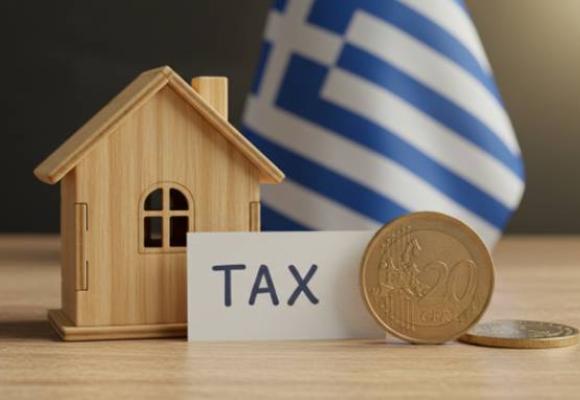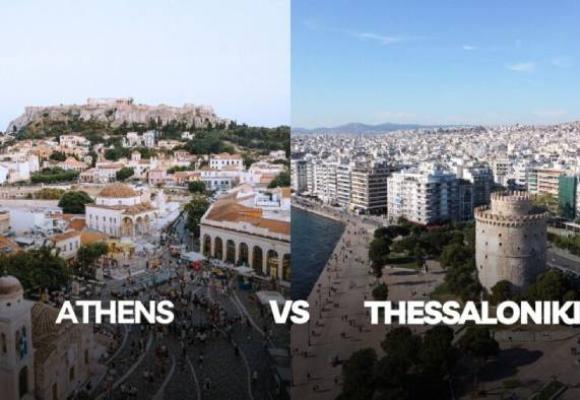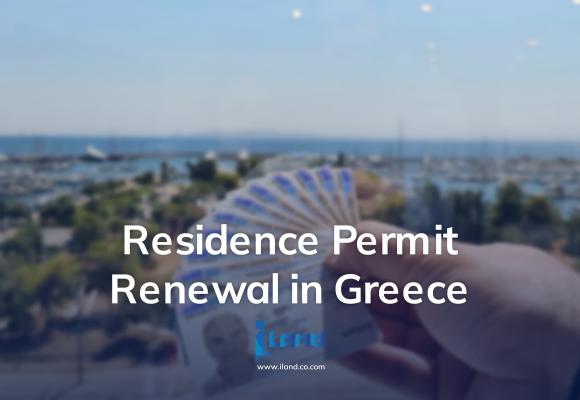Difference between Greece and Cyprus | Which is better to live in?

As of 2025, the emergence of digital nomadism has revolutionized how individuals consider where to live, work, and invest. Today, more than ever before, citizens and families are seeking fast internet and vibrant cultures, but also stable business and property laws, good real estate opportunities, and good long-term residency.
Cyprus and Greece are the two Mediterranean locations with the highest quality of life most often compared for this kind of lifestyle. What sets Cyprus apart from Greece in terms of living, investing, or moving there permanently? Is Cyprus superior to Greece, or can Greece still cater to the sophisticated global citizen, as it has for centuries?
In this article, we will examine the lifestyle benefits, investment opportunities, and residency options available in each location. Additionally, we will provide an overview of iLand, focusing on its specific real estate and residency services.
Now, let's examine the differences between Greece and Cyprus from the perspective of a citizen who seeks more than just a great vacation spot; they aim to build their future.
Introduce Cyprus country
Cyprus is an island country in the eastern Mediterranean, with an array of cultures, a warm sunny climate, and a lifestyle that is a blend of efficiency and warmth. With over 300 days of sunshine a year, stunning beaches, and a life that balances relaxation with productivity, it is no surprise many retirees, entrepreneurs, and today especially digital nomads, have chosen Cyprus as a place to flow freely between productivity and quality of life.
Cyprus is split into two parts: the Republic of Cyprus, internationally recognized as a Mediterranean island nation (primarily Greek-speaking), and Northern Cyprus, a less developed but similarly beautiful territory that Turkey occupies and thus not in the European Union. When people refer to living or investing in Cyprus, they are mainly referring to the southern part, which is a member of the European Union, with the Euro as its currency, relatively low crime rates, and high fluency of English.
Legally and from a business perspective, Cyprus is regarded as tax-friendly. Cyprus is one of the few places in the world where corporate tax starts as low as 12.5 percent, and through residency programs targeting non-EU nationals, it has positioned itself as an accommodating destination for both professionals and investors. Living as an expat in Cyprus as an American, European, or Middle Eastern national is virtually stress-free.
Introduce Greece country
Greece, or the cradle of Western civilization, is so much more than ruins and blue-domed churches. Greece is currently a member of the European Union, a thriving and dynamic hub of allure for investors, expats, and digital nomads, as well as those looking for a secure, breathtakingly beautiful, and culturally rich country to put down roots in and build a future. From city life in Athens to idyllic Aegean islands, Greece offers a diverse range of lifestyles and potential.
What makes Greece comparable to the Cyprus vs. Greece debate is its diversity and size. Greece boasts a larger and more diverse real estate market, particularly in terms of availability and size, especially in the fast-growing urban areas of South Athens, where iLand has been developing and providing high-end residential consultancy since 2014.
Suppose you're looking for an apartment priced above €300,000 with pools, terraces, and amenities, or a luxury house priced above €1 million. In that case, Greece offers a diverse selection and alternatives to suit every investment personality.
As part of our service, iLand provides property investment and offers assistance with recent changes to the investment threshold (2024 & 2025). The difference with a residence permit in Greece (as opposed to temporary visas) is that this is a long-term route into Europe - residency can include the whole family, while also giving you the right to travel within the Schengen zone, and offering a clear renewal process every five years.
Greece also offers a very good quality of life, characterized by affordable healthcare, quality education, and diverse school options, all within an international community that is very welcoming, while also providing access to both the European and World markets.
Cyprus or Greece Which is Better for Living?
Deciding where to put down roots in Cyprus or Greece involves more than just assessing climate and cost; it's about aligning your goals with the legal framework, residential opportunities, settlement options, community living, and investment opportunities.
Both destinations have a warm Mediterranean climate, historical background, friendly residents, and EU membership. However, there are also substantial differences that will make the scales tip towards one country or another, depending upon what your priorities are!
Lifestyle & Community
Cyprus offers a smaller, laid-back experience, ideal for those wanting to slow down. There is a very high expat population, and everyone speaks English, so it is good for folks without Greek; they can live a whole life without it. If you're looking for a limited beach lifestyle with close friends, Cyprus might be the perfect fit for you.
Greece offers much more diversity (metropolitan cities such as Athens, Thessaloniki, and many distinctive Islands). If you appreciate leisure with your art and culture, late-night entertainment, and feel a sense of relief for the sheer scale of a metropolitan environment, Greece has a bit more. There is still a lot of casual and leisurely lifestyle, but there is plenty of room for education, health care, and entertainment options, as well as sophistication.
Cost of Living & Services
Both are cheap compared to Western Europe, but Cyprus tends to be more expensive when it comes to food and imported goods because of the costs associated with being an island. There can also be higher utility bills in Cyprus.
In Greece, the cost of living is often cheaper, not including tourist areas, and even Athens is a good deal, when you consider it is a capital city with luxury real estate developments and the associated costs of spending your selected life there. Services that support your life, such as transport, health, and education, are more developed and accessible.
For example, if you want to know what the cost of living in Athens is, you can read about it in the other article.
Residency & Real Estate
This is a notable difference, especially for people with long-term relocation or investment plans.
Cyprus has a variety of residency options, including the Cyprus Permanent Residency Program;
However, they appear to be a bureaucratic process, and the market is much smaller. While they may have immigration pathways via investments, it may not be on the same scale and variety as those currently present in Greece.Greece is a country with a well-run Greek Golden Visa Program that is simply more substantial and future-proof. Thanks to legislation updates in 2025, investors can gain permanent residency by choosing from various real estate approaches, such as luxury residences in South Athens or converting commercial properties to residential use.
Access & Connectivity
Cyprus has minimal international direct flights and limited connectivity when flying in the off-season. The fact that Cyprus is an island sometimes contributes to the sense of being cut off.
Greece, on the other hand, with international airports in Athens, Thessaloniki, and several islands, has much better connections to Europe, the Middle East, etc. Greece makes more sense for frequent travelers, entrepreneurs, and families needing to be mobile.

What is non domicile? In the other article, we discussed it.
Cyprus vs Greece : How Is the Weather?
When choosing to invest or relocate to a Mediterranean country, the weather is typically the first consideration, especially when talking about digital nomads, retirees, or families looking for casual wear throughout the year. Cyprus and Greece offer an average Mediterranean climate, but the subtler (and essential) details to consider depend on where exactly you decide to settle in your lifestyle.
Weather in Cyprus
Cyprus usually experiences relatively mild winters and a very long dry summer season. With over 300 days of sunshine annually, Cyprus' climate is ideal for warm weather enthusiasts for most of the year. Even as early as January, daytime temperatures in Limassol and the other Southern resorts range from around 10 °C to 17 °C, making these areas of Cyprus among Europe's sunniest during winter.
Cyprus does get very hot summers, particularly inland, where the heat can easily reach above 35°C. Sea breezes will certainly moderate the heat along the coast, but air conditioning will probably be needed for most of June to September. For sun lovers, beach visitors, and other solar lovers seeking to escape colder climes, Cyprus is as close to tropical Europe as you're going to get.
Weather in Greece
Greece has a Mediterranean climate, similar to Cyprus; however, it experiences greater variation due to its geography and larger size. The two coastal cities, Athens and Thessaloniki, have hot, dry summers with warm, temperate winters, with Athenian weather being a bit colder than that of Cyprus, and less mild. The Athenian winter means temperatures range from around 7 °C - 15 °C. Those may be nice temperatures, but the season and climate in Greece is more globalized than the Cypriot weather.
The Greek islands (Crete, Rhodes, Cyclades, etc.) have a very comparable climate to Cyprus, windy, dry, and sunny, as in Northern Greece, snow and rain occur in winter, thus giving Greece a little more variety in climate, and giving some residents a charm or rhythm of seasons.
Difference Between Greece and Cyprus | Economic Conditions
When looking at Greece vs. Cyprus, one of the most significant factors for any investor, entrepreneur, or person considering a long-term residency is the economic climate. Current financial and economic conditions in both countries, opportunities, and each country's future outlook. This information goes a long way in answering the common question:
Is Cyprus better than Greece economically? Or does Greece offer more opportunities for the future in 2025 and beyond?
Economy of Cyprus
Cyprus has a relatively small economy driven predominantly by the service sector, at its core, tourism, financial services, and real estate. Cyprus has slowly but surely returned after the 2013 banking crisis, and it has relatively low levels of public debt and a stable banking environment. Cyprus has a 12.5% corporate tax rate, which makes it an attractive proposition for offshore business and international entrepreneurs.
Cyprus's real estate market, while smaller than that of Greece, is also strong and particularly active, along with coastal cities of Limassol and Paphos. Due to the small size of its economy and degree of market saturation in some aspects, the area's growth may be slower and therefore depend more on global demand.
Economy of Greece
By contrast, Greece has a larger and more diverse economy with developed sectors in tourism, shipping, agriculture, construction, and renewable energy.
After many years of austerity, Greece has emerged from the pandemic with solid economic growth and has attracted global investment, notably in real estate and infrastructure. Since then, Athens has captured the attention of international investors, particularly in areas like South Athens, where luxury residential development is highest. This is exactly where iLand has established a strong presence, directing clientele toward high-potential real estate opportunities that are both Golden Visa eligible and offer real capital appreciation.
In addition, Greece is a gateway for investment into both Europe and the Balkans, possessing larger internal markets, better connections, and a more developed legal system for international investors.
Cyprus vs Greece | Which is better for investing?
When researching investment options in Cyprus and Greece, it is essential to know the most recent economic data trends, about residency-by-investment programs, and each country's structural reforms. Both are EU members; as such, investment options are quite attractive, but understanding what to invest in will help determine if you are picking the right option!
Cyprus: Why Invest?
Corporate tax: Cyprus has one of the lowest EU corporate tax rates (12.5%) that will change in 2025.
Business Environment: Cyprus' economy is stable and service-dependent, such as within tourism, financial services, and real estate.
Real estate growth: Cities like Limassol and Paphos continue to attract foreign investors wanting discretion to buy vacation homes, retirement homes, or long-term rental income.
Easy entry: The company registration and real estate deals are generally quick and very accessible so that Cyprus could entail low-barrier access.
Nonetheless, without the economies of scale and increasing tourism pressure, more risks arise in periods of global uncertainty.
Greece: Investment Benefits
Diverse Economy: Greece has a much larger and more diverse economy and many vibrant sectors, including shipping, energy, tourism, and building.
Golden Visa: Greece is also still one of the top Golden Visa countries in Europe by designating successful investments in qualifying real estate that will lead to permanent residency for qualified non-EU nationals. If you're interested in investing in Greece real estate, you can contact us.
Real Estate Market: In particular, the real estate market in Greece is in top-performing areas of South Athens for solid rental yields and long-term increases in property value; areas that iLand is actively involved in assisting foreign investors.
Business & Startup Investment: New government incentives are supporting investment in not only real estate but also in innovative business and job-creating sectors.
Main Investment Options
1. Real Estate Investment
Cyprus: To apply for permanent residency through real estate, a person will generally need to make a minimum investment of €300,000.
Greece: Residency through an investment in real estate has three tiers based on geography that need to be taken into account:
€800,000 for central Athens and the islands that are in high demand.
€400,000 for areas that are less populated and are in development.
€250,000 for specific scenarios with commercial to residential conversions and/or preservation cases.
2. Business Development & Entrepreneurship
Cyprus: Cyprus is attractive to incorporate a company due to not only the low taxes but also the low compliance costs and procedures. Cypriots also provide excellent service and are generally welcoming in response to international operations.
Greece: Greece is appealing to individuals looking to develop a business, specifically in sectors such as hospitality, tourism, technology, and wellness. There are also indications that new avenues for startup funding will soon be included in residency options.
Which Country Is Better for Investing?
Criteria | Cyprus | Greece |
Economy Size | Smaller, service-based | Larger, diversified |
Tax Environment | Lower corporate tax | Broader investment incentives |
Residency via Real Estate | €300,000 minimum | €250k–€800k depending on property type |
Alternative Investment Routes | Limited | Includes startups, conversions, restoration |
Market Potential | Stable but limited | Growing, competitive |
Regulation & Structure | Simpler | More robust and transparent |
Conclusion
Cyprus and Greece are both investment destinations with opportunities to present in both countries – each has its unique beauty, lifestyle, and investment opportunities. Cyprus is attractive due to its very good tax advantage route, a fairly quick process, and a soothing, easy island lifestyle, making it an ideal destination for a simple investment in a typical island market.
Greece generally is a bigger investment-type opportunity that offers a more meaningful impact. It has a moving and dynamic economy; it has a currently flexible Golden Visa option; and there is a moving real estate market, in demand most noticeably in South Athens (Greece). Greece is becoming more appealing to investors seeking a lifestyle that offers sustainable long-term investment growth and eventual residency in Europe.
To sum it up, it will depend on where you want to go - but to be in a place where you can watch your investment grow, can evolve/practice your lifestyle. Ultimately a residency pathway that feels comfortable and somewhat future proof, Greece is almost always the better, smarter, and more sustainable investment opportunity.
At iLand, we help you make informed decisions tailored to your vision. Whether you're considering a real estate purchase, setting up a business, or applying for residency, our team provides end-to-end support from property sourcing to legal documentation — to ensure your move is smooth, secure, and successful.
Your investment deserves more than just a transaction; it deserves a strategy. Let iLand be your partner in Europe.
News
Keep up with the latest updates on the industry of real estate investments.

























2 comments
I can tell you from personal experience Cyprus is NOT easy and straight forward to obtain permanent residency! No one appears to fully understand the legal requirements and that includes so called migration lawyers and surprisingly the immigration officials as well!
The criteria for a visa of any sort moves constantly from year to year and it takes the migration office close on 12 months to issue any sort of visa leaving insufficient life on the visa issued to secure a Cypriot driving licence or registration with Gesy. I have lived constantly in Cyprus for close on 5 years, buying a property costing me €325,000. It took immigration from July 2021 to December 2022 to issue me with a visa that expired in March 2023! Since that date - despite my annual income increasing along with my savings - my annual visa application has been denied and it takes immigration 9 months annually to confirm this and it’s denied annually based on my annual income level that has increased from 2021 by the rate of inflation. I am 77 and live off a UK state pension along side a modest private pension with investments from the sale of my UK properties.
I can assure you that obtaining a visa in Cyprus is far from easy or accessible. Cypriots can only speak and understand English when the conversation is in their favour! The Cypriot law is so badly written it is open to vast interpretation that is understood by no one not even the government and capable of giving the UK inland revenue laws a run for its money. My personal experience of Cyprus is :- it’s hostile, unfriendly, under educated, and corrupt at the highest levels.
In reply to I can tell you from personal… by Treaoney
PermalinkSorry to hear about your bad experience — and more importantly, thank you for sharing it so openly with us.
We understand how frustrating and exhausting this process can be, especially when rules are unclear and timelines are unpredictable. This is exactly why, we offer Greek residency services, where the legal framework is more clearly defined, timelines are more consistent, and our clients generally do not face the kind of repeated uncertainty you’ve described.
Every country has its own challenges, but transparency and predictability make a real difference. We genuinely appreciate you taking the time to share your personal journey, as it helps others set realistic expectations.